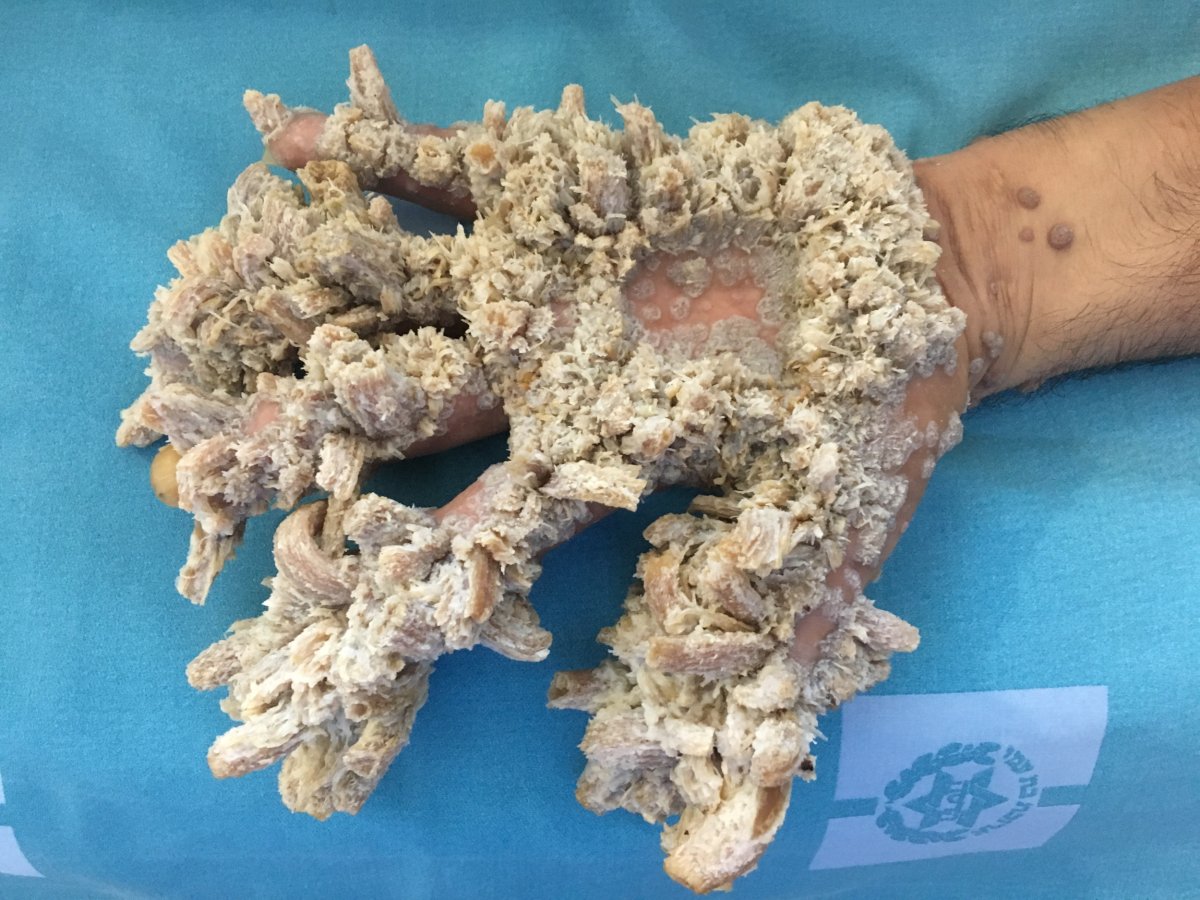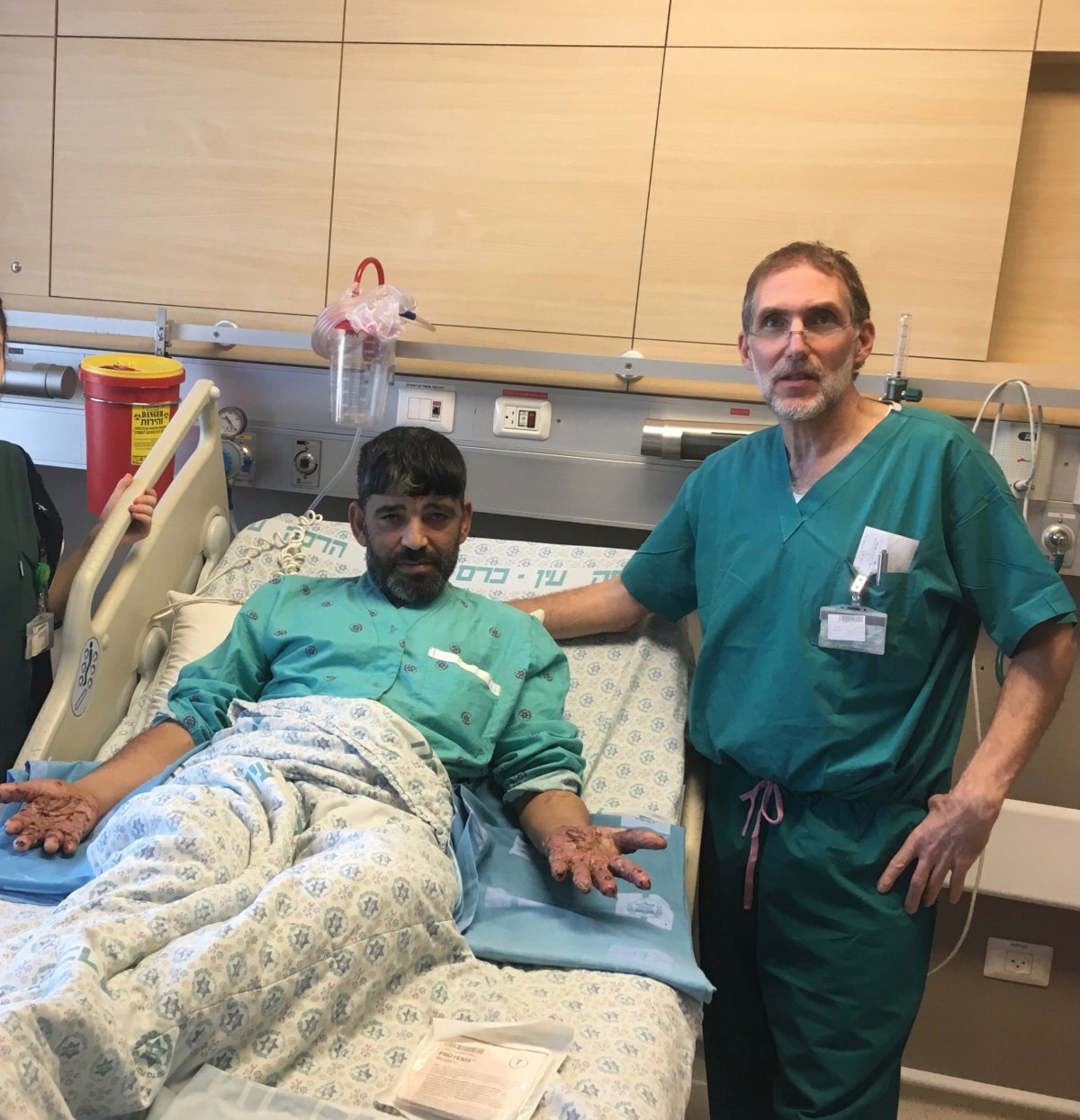A man from Gaza with an extremely rare skin condition has said he can "finally live a normal life" after "years of suffering and solitude" following treatment at a medical center in Israel.
Mahmoud Taluli, 44, suffers from epidermodysplasia verruciformis (EV)—an incurable, inherited disorder caused by chronic infection with the common human papillomavirus (HPV). This leads to unusual bark-like growths on the hands and other body parts, NPR reported. As a result of these lesions—which can cause pain—the condition is sometimes described as "tree man syndrome."
To date, there have only been around 200 cases of EV reported in the medical literature and thus research on the disease is relatively limited. As a result, there is no clear protocol for treating the disease.
One of the preferred options is to remove the lesions via surgery. However, this is not entirely effective because they tend to grow back. In Taluli's case, these growths left him unable to use his hands.
Nevertheless, Taluli has now undergone four pioneering operations since 2017 at Hadassah Medical Center in Jerusalem to remove his lesions, allowing him to regain the use of his hands.
"The surgery has completely changed my life," Taluli told NPR. "I can play with my children. I can go to family events. I no longer need to cover my hands when I go out in public."
Michael Chernofsky, an orthopedic surgeon at Hadassah who is overseeing Taluli's treatment, told Newsweek that the patient's symptoms surprised him when he first became aware of the case.
"Over the course of my 30 year career as a specialist in hand surgery, I have seen my share of challenging cases," he said. "The case of Mahmoud Taluli, however, was something that I had never before seen.
"Mahmoud initially presented to me about 2 years ago. We were his last hope. He had seen doctors throughout the Middle East and was told that nothing could be done to help him other than amputation," Chernofsky said. "He had been suffering from his condition for more than 10 years. He had lived with severe chronic pain. He could not use his left hand at all, and movement in his right hand was limited. He was embarrassed to be seen in public. He could not work. He could not play with his children."

Taluli decided to go ahead with the surgeries even though the doctors explained to him that there were substantial risks involved—i.e., he could lose his hands. The first two operations were focused on removing the growths from his hands, but doctors soon realized that preventing new lesions when treating EV is difficult.
"We realized he was just reinfecting himself by touching lesions, then touching other parts of his body," Chernofsky told NPR. "Not only are existing lesions at risk of spreading to other areas of his body, but if the deep roots of each lesion are not completely removed, the growth returns."
"You can't just shave these off at the surface," he said. "You have to remove every last shred. Removing the roots of the lesions also relieves the pain they cause as they compress nerves. In the beginning, I wasn't sure our approach would work We didn't know if there would be anything viable left of his hands, but thank God it's working."
As a result, in the two subsequent operations, the team focused on removing the remaining lesions covering other areas of his body. Taluli is now scheduled to have another operation later this year to remove any new lesions which arise.
"We continue to fight an uphill battle; Mahmoud will need further surgery as time goes on in order to remove new viral growths as they arise, and periodically in order to optimize his hand function in the absence of hand therapy," Chernofsky said. "Ultimately, we still need to find a vaccine or curative immunologic treatment for him in order to repair his deficient immune system."
"Surgery cannot possibly cure his deficient immune system," he said. "There are billions of skin cells on the human body, and there are billions of HPV viral particles infecting his skin. Even if we were magically able to remove all of the skin on his body and replace it with grafts, he would continue to get infected and to develop recurrent growths, because his immune system would remain incapable of fighting recurrent invasion from the HPV virus, which is everywhere."
EV is the result of a hereditary disorder that leaves the body unable to cope with certain types of HPV—a virus which affects around 80 percent of sexually active people at some point in life, according to the Cleveland Clinic. Most infections of the virus cause no symptoms, but sometimes it can lead to the development of warts in certain regions of the body.
Furthermore, a handful of the more than 150 known strains of HPV have been linked to some types of cancer, such as those which affect the cervix, anus and vagina.
"Mr. Talluli has some sort of rare, complex immunodeficiency such that he is healthy is every other respect but for some reason cannot combat the HPV virus the way the rest of us can," Chernofsky said. "HPV virus is ubiquitous; it is the most common viral infectious agent on the planet. Most of us have adequate defense mechanisms to fight and subdue these invaders."
"Unfortunately for Mr. Talluli, the HPV virus can easily invade his skin barrier and overwhelm any attempt at control," he said. "The viral particles hijack his epidermal cells, take them over, and convert them into factories that produce not only more viral terrorists, but also produce the scary looking keratinous growths that look like parts of a tree. These growths not only pose a cosmetic and functional problem, but also can transform into certain types of cancer."
This article was updated to include additional comments from Michael Chernofsky.

Uncommon Knowledge
Newsweek is committed to challenging conventional wisdom and finding connections in the search for common ground.
Newsweek is committed to challenging conventional wisdom and finding connections in the search for common ground.
About the writer
Aristos is a Newsweek science reporter with the London, U.K., bureau. He reports on science and health topics, including; animal, ... Read more
To read how Newsweek uses AI as a newsroom tool, Click here.








